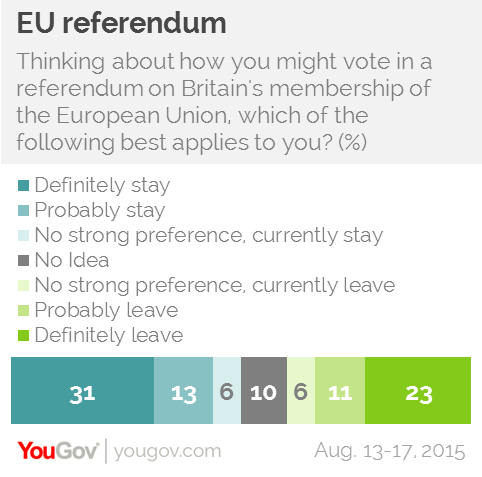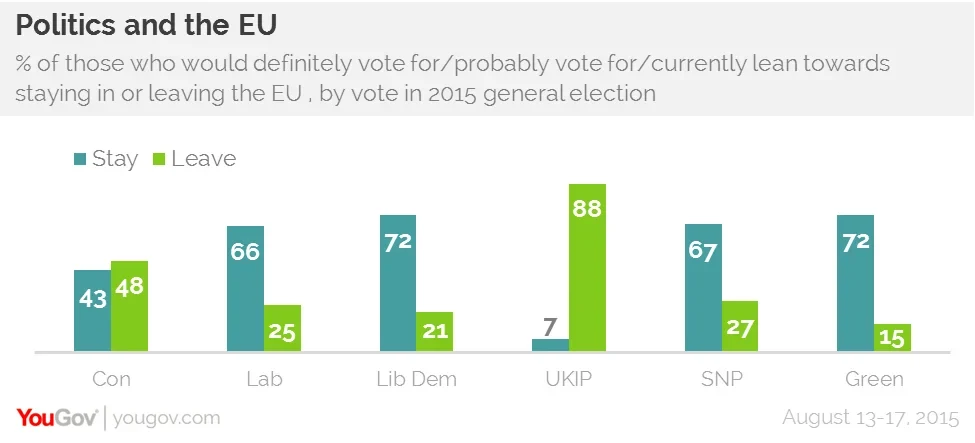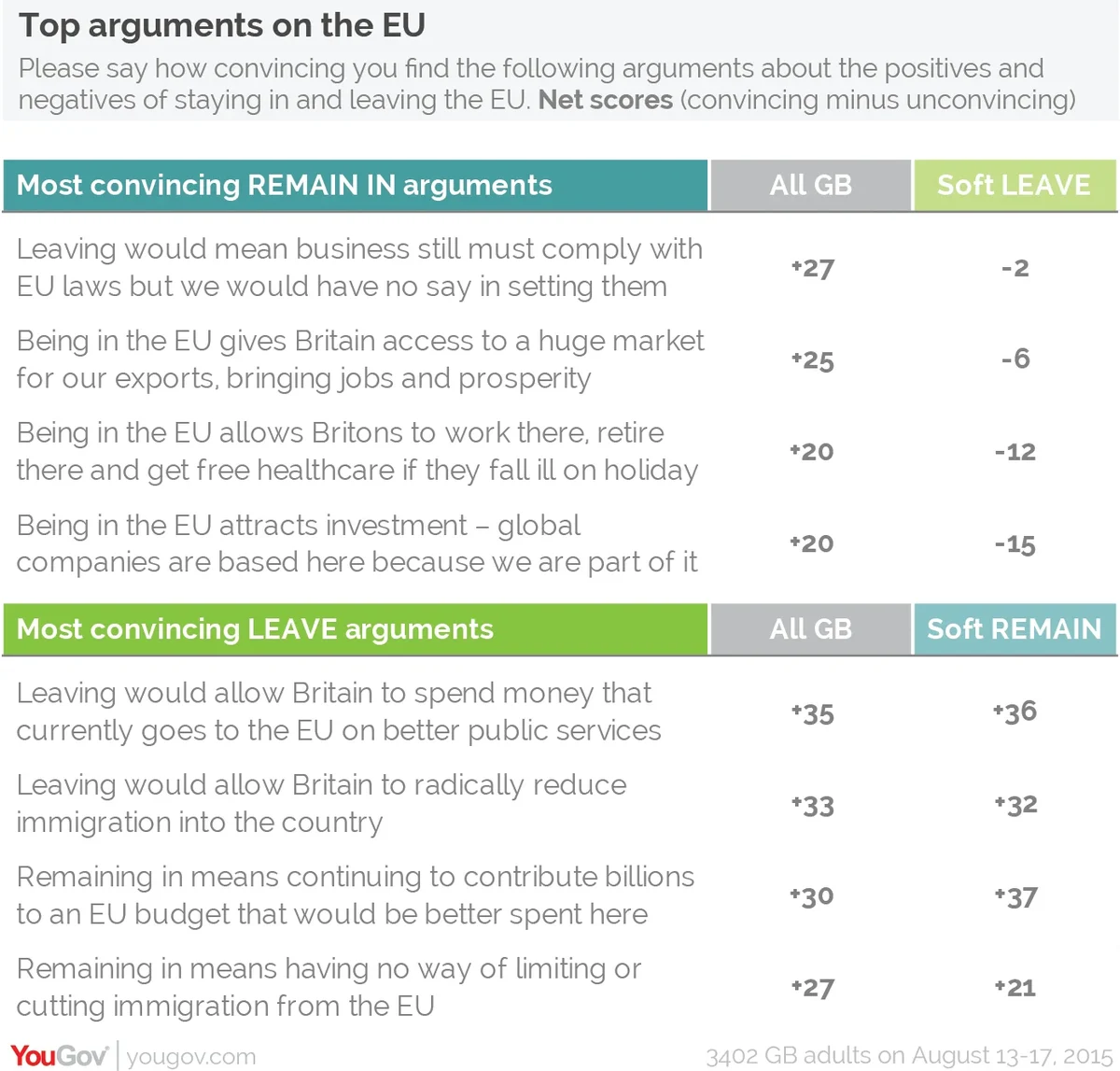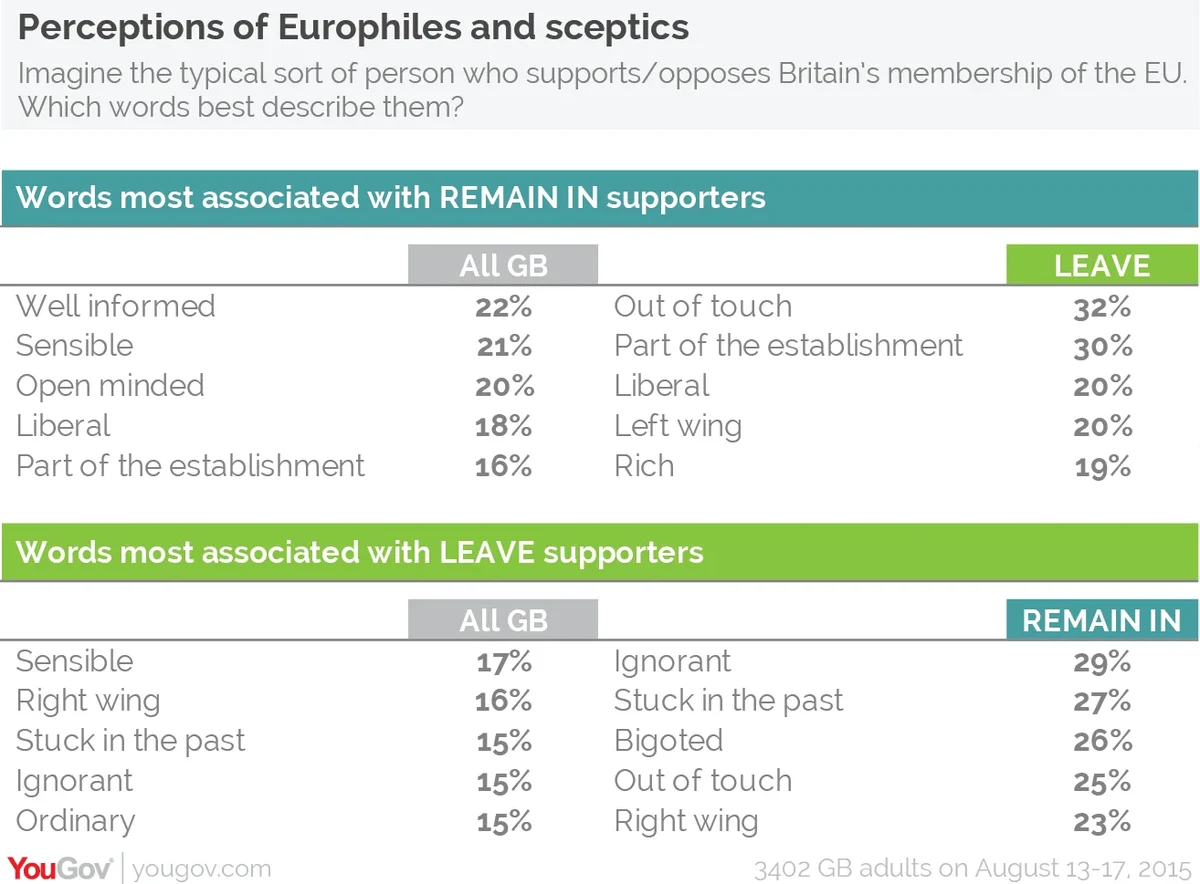In-depth YouGov polling conducted over the summer reveals the challenges and opportunities for those campaigning to stay in or leave the European Union
With the Labour leadership election out of the way, the next year or two of Westminster politics is likely to be dominated by the issue of Europe, or more specifically, David Cameron’s promised renegotiation and referendum on EU membership.
Asked which way they are most likely to vote and whether they may change their mind 50% are currently leaning towards voting to stay, 40% are leaning towards voting to leave, 10% have no idea at all. The core pro-EU support, those who say will definitely vote to stay, is 31% with a further 19% saying they would currently vote to remain but could be persuaded to vote to leave. Core support for leaving is 23%, with 17% currently voting to leave but open to persuasion.
Who is voting to Remain and Leave?
There is a strong correlation between attitudes to Britain’s membership of the EU and age. Under 25s lean towards staying by 64% to 23%, over 60s lean towards leaving by 52% to 43%. Older voters, of course, are historically far more likely to actually vote.
Looking at social class a majority of pro-EU voters are middle class (57% are in social classes ABC1, compared to 47% of anti-EU voters). Here the traditional turnout advantage would work the other way, middle class voters tend to be more likely to turnout at elections, and are more likely to support Britain remaining in the EU.
Pro-European voters have a higher household income, are more likely to be in work, but less likely to own their house outright. 37% of pro-EU voters have a university degree, only 15% of anti-EU voters do. All these differences are to some degree factors of age (older people grew up when fewer people went to university and house prices were lower) but in summary, younger, middle class, graduates tend to be pro-EU, older, working class, less well educated people tend to be anti-EU.
Committed leave supporters, while smaller in number than committed remain supporters, are also more vocal. 17% of those who are certain to vote to leave say they discuss the issue of Britain’s membership of the EU very often with friends and family, compared to just 6% of those who are certain to vote to stay.
Party Divisions
Referendum splits voters of all parties. UKIP are, predictably, the most united, though there are even a small number of pro-European UKIP supporters. The Liberal Democrats and Greens very heavily support staying. Labour and SNP voters strongly lean towards staying. Conservative supporters split down the middle, with very slightly more Tories leaning towards leaving.

The campaign to stay in the EU had a huge advantage amongst supporters of the parties of the left. The campaign to leave has only UKIP wholly onside, with the Conservatives split. The divisions within Conservative and Labour ranks will probably shift significantly once leading figures within the parties take a more explicit line – to some degree party supporters opinions will be influenced by the signals their party leaderships take. At the current time this is still unclear – David Cameron is expected to recommend people vote to stay, but we don’t know which leading Tory figures will declare in favour of leaving. Similarly Labour’s presumed full support for staying in the EU has been put into question by the election of Jeremy Corbyn.
Arguments
We tested positive and negative arguments for both sides of the campaign (negative arguments about the EU, and positive ones about the opportunities outside the EU; positive arguments about the EU and negative ones about the risks of the leaving the EU).
For those in favour of staying, the arguments that were seen as most convincing were that EU market access brings jobs and prosperity, that outside of the EU we would end up having to follow the same rules to trade with Europe, we just wouldn’t have any say, and that EU membership offers advantages like being able to live and work elsewhere in the EU. These were also the arguments that soft LEAVE voters found most convincing.

For those in favour of leaving, the arguments seen as most convincing were those around immigration and money currently spent on EU membership being better spent on services in Britain. These were also the arguments seen as most convincing by soft REMAIN voters. The most convincing anti-arguments were seen as convincing by over 60% of soft REMAIN voters, in comparison the strongest pro-arguments were only seen as convincing by just over 40% of soft LEAVE voters.
Perceptions
It would be wrong to focus solely upon issues and arguments though. People are not logical calculating machines who vote upon a careful balancing of rival arguments, what determines who we vote for is far more complicated. In general elections it is a mix of broad perceptions of the parties, who is competent, who we identify with and who reflects our values, and of the party leaders themselves. In a referendum we are not picking a party or politicians to govern us, but perceptions of values and identities are still important, it still matters what we think we are saying about ourselves when we vote.
Asked about the typical supporter of EU membership and the typical opponent, supporters of the EU are perceived as being well-informed, sensible, open-minded, liberal. Those who support leaving the EU tend to perceive it’s supporters as being out of touch, part of the establishment, liberal and left-wing.
The words most associated with supporting British exit from the EU are sensible, right-wing, ignorant, ordinary, stuck-in the past. Those who would vote to leave see those who agree with them as sensible, ordinary, well-informed and seeing things others don’t. Those who support EU membership see those opposed as ignorant, stuck in the past, bigoted and out-of-touch.

Unsurprisingly supporters and opponents of EU membership have positive perceptions of those who share their views and negative perceptions of those who don’t, but the negative associations of the LEAVE campaign seem to be more worrying for them: being associated with backwardness, bigotry and ignorance seems, qualitatively, a more worrying charge than being associated with a liberal, left-wing establishment.
When it comes to the campaign, both campaigns will want to paint them as a cause that is supported by well-informed, sensible, ordinary people – the sort of people that floating voters will be happy to be associated with - and play up the negative perceptions of their opponents.
Risk Aversion
Referendums give a natural advantage for the status quo – the public tend to move towards the perceived safety rather than the perceived risk of change. Historically the vast majority of referendum campaigns across the world have displayed a movement towards the status quo during the referendum campaign. In the handful of exceptions to the rule, such as the Scottish Independence referendum in 2014, the campaign for change has managed to also make the status quo look risky – for example, Alex Salmond campaigning on how remaining part of the UK would pose a risk to Scotland’s NHS.
Currently 58% of people think leaving the EU would be very or fairly risky for Britain, 32% think it would pose little or no risk. Unsurprisingly perceptions of its riskiness are concentrated amongst those who support staying, but even among those who would vote to leave but might change their mind over a third see leaving the EU as risky, suggesting there is potential for a campaign playing upon the risks of Brexit to drive some voters away from LEAVE.
However, asking only about the riskiness of leaving the EU would be to assume that the status quo is perceived as risk-free – it is not. 38% think Britain remaining in the EU is very or fairly risky, 48% think it poses little or no risk. Naturally the status quo is seen as less risky than change, but it is less clear cut that might be expected. 26% of soft REMAIN voters think remaining in the EU is very or fairly risky. The LEAVE campaign will want to try and persuade voters that staying a member of the European Union also brings risks.
What might happen?
Our polling so far shows potential for both sides. Those in favour of Britain’s membership of the EU currently have the lead and have a larger base of support. They also have the benefits of being the status quo option, meaning they have a head start in portraying themselves as the safe option and their opponents a leap in the dark.
However, the obvious arguments in favour of EU membership poll badly when compared to some of the arguments against. Arguments about leaving the EU costing jobs and prosperity are not seen as being as convincing as more straightforward arguments about being able to cut immigration and spend EU contributions on services. The campaign to remain in the European Union need to find some arguments that are as effective as those of their opponents.
Taking arguments in isolation can be misleading though. Anti-immigration arguments look like a winner on paper, but people will judge the campaigns and arguments as a whole. Our polling also found potential for the LEAVE campaign to be seen as ignorant and bigoted. Playing the anti-immigration card may play to those negatives. The actual leave campaign will need to paint a positive image of Britain outside Europe to counter people’s fear of the unknown, not be seen as narrow-minded and fearful.
PA image










